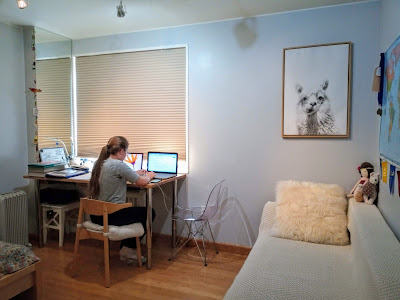I want to share few suggestions I learned from the webinar “Trauma-Informed Approaches to Student Mental Health During COVID-19” Presented by Presence Learning & iOpening Enterprises
The speakers were Dr. Isaiah Pickens and Stephanie Taylor, Ed.S, NCSP
“Covid-19’s Impact on Students’ Academic and Mental Well-Being. The pandemic has revealed - and exacerbated - inequities that hold many students back. Here’s how teachers can help. By Youki Terada” Check the link below for the article:
https://www.edutopia.org/article/covid-19s-impact-students-academic-and-mental-well-being
Dr. Isaiah Pickens talked about “Finding Your Power with Wellness”
He
pointed out “Challenges:
- Students are disoriented due to transitions to virtual platforms, varying schedules, and directives.
- Students are worried about family members’ health and uncertainty about whether schools are safe and will stay open.
- Educators have new protocols to learn while managing their same responsibilities from prior to the pandemic.
- Staff have concerns about family members and others in their life who may become sick due to their work at school, or losses that have impacted their family.
- The ability to create an inclusive classroom is heightened as a result of a refocus on social and racial justice.
- Understanding how to manage cyberbullying and other forms of bullying related to membership in a group that has historically experienced oppression is difficult.
- Staff are unsure of how to navigate the various perspectives and life experiences of students from different backgrounds.
- Experiencing or witnessing the stress and trauma of discrimination or injustice can compound the feelings of stress.
- Integrate a whole-school approach that can manage multiple challenges for students and staff while reflecting the values of the community.”
As
well as “Opportunities” which appear along with those challenges:
- “With the language to share the impact of current stressors, students can prepare for the ongoing changes that occur.
- Learning coping skills for both in-person and virtual challenges such as potential social isolation or having new routines can support emotional regulation.
- Integrate new protocols with trauma-informed procedures that support staff and students to manage the stressors related to work.
- Use social-emotional, whole-school strategies to create spaces in which both staff and students can acknowledge the current challenges while promoting ongoing support.
- Opportunities for students to engage in radical healing can begin to heal wounds related to discrimination.
- Discovering language to understand how stress is connected to important parts of students’ identity can support strategies for combating bullying.
- Engaging culturally-responsive teaching practices can create more inclusive classrooms and schools.
- Providing opportunities for students to honor and recognize their identity can support increased academic engagement.
- Employ a holistic approach with targeted interventions for students and sustainable supports for staff to maximize their potential despite challenges.”
Next
Steps for Students suggested by Dr. Isaiah Pickens are:
- “Engage in a student wellness program to support managing stressors related to adjusting to the pandemic and beyond.
- Finding Your Power in Uncertain Times:
- Live, online small group therapy
- Trauma-informed, cognitive-behavioral, mindfulness-based, and culturally-responsive tools that will help students manage unhealthy responses to current events
- Techniques to navigate pervasive anxiety, depressed mood, and interpersonal functioning challenges
- Skills to better self-understanding through bolstering resilience-based strategies and ability to find meaning and growth during difficult life experiences
Next
Steps for School Leaders suggested by Dr. Isaiah Pickens are:
- “Provide professional development for staff to develop the skills to continue managing the adjustments related to the pandemic.
- Support educators’ ability to understand trauma and partner with mental health professionals to support healing.
- Develop culturally-responsive practices to effectively educate the whole child.”

No comments:
Post a Comment